Henry Clay Bruce's 'The New Man: Twenty-nine years a slave, twenty-nine years a free man' is a powerful memoir that sheds light on the harsh realities of slavery and the journey to freedom. Written in a straightforward and honest style, Bruce's account explores the physical and emotional toll of his 29 years in bondage, as well as the challenges he faced as a free man in a society still deeply entrenched in racism and prejudice. The book serves as a poignant reminder of the resilience and strength of the human spirit, and the ongoing struggle for equality and justice. Bruce's narrative is a significant contribution to American literature, offering a firsthand account of slavery and its aftermath, and highlighting the importance of perseverance and hope in the face of adversity. Henry Clay Bruce, a former slave himself, wrote 'The New Man' as a way to share his experiences and advocate for social change. His personal story adds depth and authenticity to the narrative, making it a compelling and thought-provoking read for anyone interested in history, social justice, and the enduring power of the human spirit.
Dieser Download kann aus rechtlichen Gründen nur mit Rechnungsadresse in A, B, BG, CY, CZ, D, DK, EW, E, FIN, F, GR, H, IRL, I, LT, L, LR, M, NL, PL, P, R, S, SLO, SK ausgeliefert werden.









